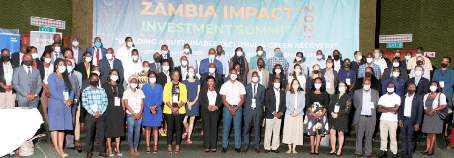Experiential Learning for Sustainable Development
Ignite India’s tailored, place-based approach
Focus on Zambia

An impact economy is a just, regenerative, and equitable economic system in which positive impact is produced in an environment of risk and return. In an impact economy, governments, organizations, investors, and consumers are motivated to include marginalized and underserved sectors of the society in the mainstream economy, while also serving the needs of the environment. A healthy impact investment ecosystem is essential to a functioning impact economy. This article describes early efforts to build such an ecosystem in Southern Africa, specifically the country of Zambia.
In August 2017, a volunteer-run group named Impact Investment Exchange (IIX) Chapter Lusaka was established in Lusaka, Zambia, as only the second on the African continent after IIX in Johannesburg, South Africa. Following training provided by the IIX Lead, a team of millennials just graduating from University of Zambia (UNZA) took it upon themselves to carry out the first ever mapping of the prospective impact investment ecosystem landscape in Zambia, the finding of which was subsequently discussed along with an extensive background report at a Roundtable on Mainstreaming Impact Investing in December of 2017 in Lusaka, Zambia.
 Given the youth and inexperience of The IIX Chapter Lusaka team, there was agreement that they needed to ally themselves with more experienced and fellow purpose-driven professionals to facilitate outreach and to expand Lusaka’s awareness about impact investing. The IIX Chapter Lusaka’s first roundtable brought together 23 non-IIX local experts representing a wide spectrum. The seeds of the Zambian Impact Revolution had been sown.
Given the youth and inexperience of The IIX Chapter Lusaka team, there was agreement that they needed to ally themselves with more experienced and fellow purpose-driven professionals to facilitate outreach and to expand Lusaka’s awareness about impact investing. The IIX Chapter Lusaka’s first roundtable brought together 23 non-IIX local experts representing a wide spectrum. The seeds of the Zambian Impact Revolution had been sown.
The following December, the Global Steering Group on impact investment (GSG), with support from IIX Chapter Lusaka (today named Impactpreneurs Africa Limited) and 4IP Group LLC brought together 45 stakeholders to discuss the nascent impact investing movement in Zambia. A taskforce was constituted for the establishment of a National Advisory Board (NAB) for Impact Investment within the GSG.
The joint GSG-IIX Chapter Lusaka meeting ended with a call from all invited guests to be part of the proposed Taskforce for the NAB. Without hesitation, 18 people expressed an interest in participating. Consequently, the meeting led to a taskforce whose main task was to draft a business plan for the establishment of a GSG NAB Zambia.
The GSG formally announced the launch of a National Advisory Board for Impact Investment (NABII) in Zambia during the 2019 GSG Impact Summit held in Buenos Aires, Argentina.
The NABII Zambia strategic direction was to be governed by the objective of ensuring a continued and sustained impact investment that recognises a return of capital while creating both social and environment benefits.
The impact economy in Zambia is still rather nascent, and is today dominated by development finance institutions making investments in large-scale projects. However, the social entrepreneurial landscape is slowly expanding thanks to government efforts to support entrepreneurs, as well as grants from technical assistance funders such as Prospero-Zambia, which have resulted in a growing pool of market enablers such as BongoHive, WEAC, Impact Hub Lusaka, and Accelerated Growth for SMEs (AGS).
The GSG aims to change the world country-by-country. The main achievements of NABII-Zambia have so far been:

Source: NABII-Zambia Newsletter Issue No.4, Oct-Dec 2021.
According to the 2020-22 NABII Strategic Plan, the aim is to provide a platform to promote a compelling impact investment narrative that catalyzes an impact economy by accelerating the growth and effectiveness of the impact investment ecosystem in Zambia.
An impact economy is a just, regenerative, and equitable economic system in which positive impact is produced in an environment of risk and return.
In 2021, NABII-Zambia commissioned a Zambia Impact Investment Market Sizing (ZIIMS) study from 4IP Group, which is a follow-up study building on the previous Kukula Capital baseline study prepared in September 2019. The ZIIMS study addresses and analyses 18 non-Development Finance Institutions self-identifying as impact investors, and 5 DFIs, which together are deploying capital into enterprises across 7 “impact sectors”.
The study aggregates a total of USD 85.17 Mn of assets into 28 impact enterprises, which were split between:
The study compiles the most comprehensive dataset to date on the Zambian investment fund universe, providing a clear picture of the state and size of the country’s impact investment market.
The non-DFIs were also asked to rate the quality of the providers of impact investment information and facilitation support in Zambia. Some were unaware about NABII-Zambia. Others perceived NABII-Zambia’s quality in these areas to be good.
Perhaps the biggest achievement of NABII-Zambia has been that it has succeeded in introducing the concept of impact investment into the newly elected Zambian Government’s 8th National Development Plan, 2022-2026 under the category of low-cost finance (see figure 1).
Figure 1; Source: MoFNP, 2022:100.
Related Content
Comments
Deep Dives
RECENT
Editor's Picks
Webinars

Featuring
Lizz Welch & Jennifer Roglà
iDE
May 16 - 12:00 PM EST
News & Events
Subscribe to our newsletter to receive updates about new Magazine content and upcoming webinars, deep dives, and events.
Become a Premium Member to access the full library of webinars and deep dives, exclusive membership portal, member directory, message board, and curated live chats.
0 Comments